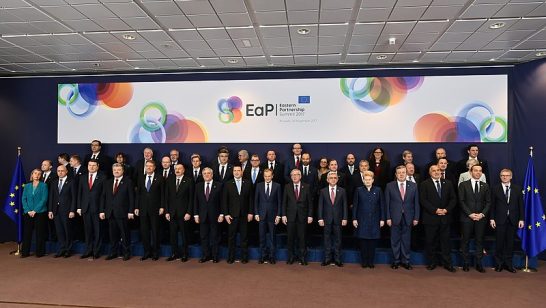
Assessing the European Union’s Eastern Partnership (EaP) is a tough task. It doesn’t take much effort to find good arguments to criticize as well as to praise it. The EaP was designed to narrow down the general aims of a stable neighbourhood outlined by the broader European Neighbourhood Policy (ENP), but still remained an umbrella policy covering six extremely different countries. Add the variety of issues addressed by the initiative, and you have a complex pattern of policies and outcomes. One thing cannot be ignored – the EaP countries have become more diverse, not less, over the last six years. In the case of Belarus, Armenia and Azerbaijan, a measure of the success of the EaP can be assessed using the simple indicator of improved political dialogue with the EU. In case of Georgia, Moldova and Ukraine, due to their having signed Association Agreements (which is in itself an achievement of one of the important initial goals of the EaP) further implementation of the initiative is inseparably connected with the pace of transformation in these countries. And it is within these three “leader countries” where one of the most important challenges for the EaP lies.
Despite huge differences between Georgia and Moldova, they face one similar problem – declining support for the idea of European integration. However, this trend has not been reflected in a dramatic shift in government priorities. What can be observed though is that the number of “euro-enthusiasts” in these societies is stagnating, and the size of skeptical minorities remains politically significant and by no means can be ignored. What is even more important is the decline in popularity of pro-European political forces and the rise of those that are openly pro-Russian. Ukraine presents a partial exception, where the decline of trust in pro-European authorities does not drive pro-Russian sentiments, but this is mostly due to the ongoing conflict in Donbas.
One could argue that the decline of support for the ruling authorities is nothing extraordinary. There are reasons to think, however, that the problem runs deeper and may have a long-term impact on the quality of politics in the EU’s Eastern neighbourhood. In all three cases, opinion polls show the decline of trust in state institutions in general. The broad-based stagnation of support for the idea of European integration may not appear to be a result of the costs of reforms, but rather a symptom of a crisis of democracy, as described by Ivan Krastev in his last book In Mistrust We Trust. This, in turn, undermines the principle of joint ownership, understood as a genuine mutual commitment to reforms undertaken within the framework of the EaP. Reforms introduced by an untrusted (not simply unpopular) government—regardless of their content—will obviously face more resistance. It is an imminent question of the EU’s external policies as addressed to its direct neighbourhood: how to exert external top-down pressure and stimulate internal bottom-up pressure on governments, and how to wisely combine these efforts in order to achieve the desirable effect of transformative power in action and not to provide convenient political ammunition to those forces opposed to the EaP’s success.
Better communication strategies will not solve the problem entirely, especially if we talk about the afore-mentioned “leader countries”. Reforms proposed within the framework of Deep and Comprehensive Free Trade Agreements (DCFTA) are technical and sophisticated and their benefits (as well as potential threats) hardly understandable for an average citizen. Once again, promoting them paves the way for accusations of manipulating public opinion, using propaganda and promoting “foreign interests” at the cost of domestic ones. In other words, such reforms can easily be discredited if there is no trust between citizens and the government, even if they seem to be objectively beneficial to the countries and societies.
Obviously, the EU faces a huge number of problems of varying sizes in its Eastern neighbourhood that urgently need to be solved. The ongoing de facto war in Ukraine is the most evident and the most urgent. The EaP has no built-in instruments to deal with such problems. Rethinking the balance of policy priorities and matching policy tools to the reality on the ground is obviously an important and at the same time very hard task for the Riga summit and beyond. However, we should admit that these modifications are tactical in their nature. If we find a way to improve the “policy formula” of the EaP, the only gain (though very important in itself) is the possibility to manage the existing problems within EaP countries better. But if this is not paired with an improvement of trust between citizens and the authorities of the EaP countries, it does not guarantee stability in the region in the long run.
The upcoming Riga summit is a good moment to answer the following questions, which have hung in the air since the inception of ENP and which was not answered by the EaP so far. Are these policies primarily an attempt to manage security threats in the EU’s immediate periphery? Or are they primarily an attempt to integrate the neighbourhood with the EU? If it is the former, it would be wiser to focus on exclusively tactical issues. However, according to the original 2008 Commission Communication, “the EaP will be based on mutual commitments to the rule of law, good governance, respect for human rights, respect for and protection of minorities, and the principles of the market economy and sustainable development”. If these mutual commitments are not just an empty slogan, the EU should now start looking for a way to face the above-mentioned challenge of internal distrust that may prevent EaP countries from going the long-lasting way of stable democratic development.
The opinions articulated above represent the views of the author(s), and do not necessarily reflect the position of the European Leadership Network or any of its members. The ELN’s aim is to encourage debates that will help develop Europe’s capacity to address the pressing foreign, defence, and security challenges of our time.


